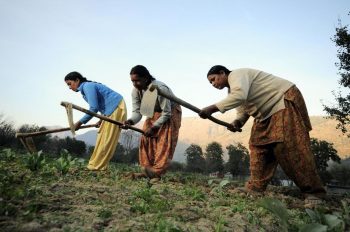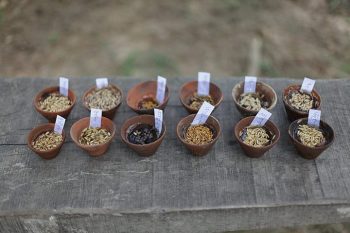Contributing writer for Wake Up World
For some time now, we’ve been hearing about the important role women have in curbing environmental destruction. After all, the argument goes, the patriarchal system is at the root of our environmental problems — with its sole focus on the profitable bottom line and a complete disregard for the effect industry has on clean air and water, animal habitats, human health and our food supply.
What we need is a more feminine approach that sees value in preserving and caring for our natural world.
Granted, there are plenty of men who are extremely concerned about the environment and are actively working towards protecting our gorgeous planet. But here’s the problem: when faced with the severe effects of environmental degradation, impoverished women have the most to lose. Around the world, these women have the main responsibility for meeting household needs. In other words, they are ultimately responsible for making sure they and their children don’t starve, while also providing reliable shelter.
[pro_ad_display_adzone id=”110028″]
And because women generally have lower class standing in developing nations, fewer options for birth control, as well as a more difficulties finding work that will support their family, when the ravages of climatic changes (flood, drought and other natural disasters) enter onto the scene, these women and their families are extremely vulnerable. Which is why many NGOs are focusing on empowering women through education and micro-loans to start businesses.
Often, part of this education includes learning about the importance of preserving the environment and developing more sustainable practices with fuel for cooking, food cultivation and water conservation. One success story of this trend is India’s female “seed guardians” — pioneers in the organic farming movement and major players in protecting the environment for generations to come.
A Ray of Light in a Genetically Modified World
Over ninety-percent of cotton grown in India is now genetically modified. Not only is Bt cotton an environmental nightmare — requiring high use of chemical pesticides “as farmers growing this GE crop are now finding themselves entangled in Bt-resistant superbugs, emerging secondary pests, diminishing natural enemies, destabilized insect ecology, and the need to keep spraying chemical pesticides to deal with the increasingly uncontrollable situation,” says Lo Sze Ping, Greenpeace China program manager — but, because the cotton hasn’t naturally evolved to adapt to the ecosystem it’s growing in, the plant isn’t as hearty as traditional varieties. This lack of adaptation usually requires farmers to irrigate more with water that’s becoming increasingly scarce. For farms in India that are rain-fed, this situation is disastrous if the monsoons turn unpredictable, which we’re already seeing.
On top of that, Bt cotton seeds are expensive for farmers. Hybrid cotton seeds cannot be replanted post-harvest, which in turn forces farmers to add to their financial burden by buying new seeds from the market [source]. Then you have the cost of increased chemical use. The entire cycle is bad news for the livelihood and health of farmers, as well as the environment.
Enter India’s female smallholder’s and “seed guardians.”
In the Bhimdanga village in Odisha, eastern India, a group of women have come together to create smallholder organic farms spanning 310 acres — along with a special storage bank that preserves a variety of seeds like millet, okra, pumpkin, lentil, cotton and kalajira rice — “a scented, local variety [that] gives us a high-yield,” says Nabita Goud, an organic and Fair Trade-certified farmer. “We are now conserving it.”
She is just one of 18 seed guardians who are part of the seed conservation project. In two years, six seed banks have been established in five villages throughout the region, which conserves 50 varieties of fibre and food crop seeds.
“The programme aims to promote women-managed and controlled seed enterprises,” said Arun Ambatipudi, one of the founders of Chetna Organic. Chetna was established 10 years ago to enhance sustainable livelihood options for smallholder families that are dependent on rain-fed agriculture. [source]
About 56 percent of India depends on rain-fed agriculture. Unfortunately, conventional farmers are typically forced into a never-ending loop of debt due to erratic weather, the cost of seeds and pesticides, poor soil, and market fluctuations.
“We practice organic agriculture,” said Nabita, who farms on three acres of land. “There are challenges. The traditional variety of cotton has a lower yield than the hybrid one, but we know it’s good for the soil and the environment. And organic is better for health.” [source]
Since organic mixed cropping is practiced in Bhimdanga, even if the cotton fails, the farmers are ensured individual food security. According to Ramprasad Sana, an entomologist and technical head at Chetna Organic, the program has provided food security for 600 families in the area.
The seed bank enables women farmers to easily share and store seeds. A farmer “withdrawals” a kilo of seed and then “repays” the loan with 1.5 kilos after their seed harvest. With this system in place, organic farmers no longer need to purchase seeds from the market. In 2016 alone, 1,594 kilos of seeds were distributed to 603 farmers.
“With women like Nabita taking back control of their seeds, soil and food security, the smallholders of Bhimdanga are becoming part of a thriving, sustainable community that is conserving India’s indigenous seed heritage and protecting its food sovereignty,” notes Guardian journalist Bijal Vachharajani.
Lastly, Indian organic food advocate and eco-nutritionist Kavita Mukhi reminds us:
“Consuming planet-friendly food is not just about feeding our body. It is about taking care of our earth. Our bodies move on but our earth is here to stay and nourish the generations to come. Every choice we make towards the way we decide to live makes a difference to the air we breathe, water we drink and soil we depend on.”
Related reading:
Article sources:
- www.greenpeace.org/international/en/news/features/adverse-impacts-of-ge-bt-cotto
- www.un.org/womenwatch/daw/followup/session/presskit/fs11.htm
- www.theguardian.com/…/meet-indias-female-seed-guardians-pioneering-organic-farming
- www.thebetterindia.com/2935/women-entrepreneurs-organic
- www.articles.mercola.com/sites/articles/archive/2012/04/03/gmo-crops-affect-farmers.aspx
- www.bu.edu/pardee/files/2010/04/UNsdkp003fsingle.pdf [PDF]
Recommended articles by Carolanne Wright:
- Scientists Warn Chemotherapy Treatment May Encourage Aggressive Tumors and Spread Cancer
- Renowned Harvard Psychologist Says ADHD is Largely a Fraud
- Hyperbaric Oxygen Treatment Reverses Fibromyalgia in 70% of Patients, Researchers Find
- Wealth and Social Media Breed Narcissism and Lack of Empathy, Says New Research
- Over 100 Scientific Studies Agree: Cannabis Annihilates Cancer
- If You Care About Animals and the Earth, Here’s Why You Need to Boycott Palm Oil Immediately
- Latest Research on CBD Oil Offers New Hope for Healing Leaky Gut Syndrome and Autoimmune Disorders
- Scientific Breakthrough: Alzheimer’s Ultrasound Therapy Fully Restores Memory Function in Mice
- Why You Should Have a Himalayan Crystal Salt Lamp in Every Room of Your House
- New Research Links Hand Sanitizer Use With Thyroid Cancer
[pro_ad_display_adzone id=”110025″]
[pro_ad_display_adzone id=”110027″]








